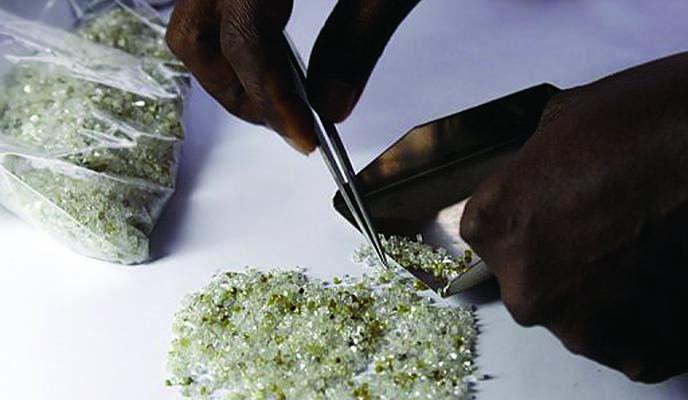
MUMBAI, India — Zimbabwean diamonds could be classified as “conflict diamonds” and barred from world markets, if rights groups meeting here have their way.
At the Kimberley Process (KP) reform meetings currently underway in Mumbai, India, the Kimberley Process Civil Society Coalition (KPCSC), a coalition of rights groups involved in the diamond industry, are lobbying for a new definition of conflict diamonds that could restrict market access for Zimbabwean gems if applied.
The new definition would include reference to “public security forces or private (including criminal or mercenary) armed groups”, as well as to “systemic and widespread violence, forced labour, the worst forms of child labour and violations of international humanitarian law”.
The KPCSC cites Angola and Zimbabwe as examples of countries where both State security forces and private security have “committed atrocities to clear land for large scale mining”. Cases of shootings by “private security actors also remain an issue in a number of producer States”, according to the grouping.
“To some, this may all sound like old news”, says Farai Maguwu of the Centre for Natural Resource Governance (CNRG), a KPCSC member organisation based in Manicaland. “But for affected communities, it remains today’s tragedy.”
Consumers are becoming more sensitive to the origin of the diamonds used in the jewellery they buy, the activists say.
“In this information age, it’s increasingly difficult to ignore links between diamonds and ethics issues like violence,” says Shamiso Mtisi, KPCSC member and head of the Zimbabwean Environmental Lawyers Association. “The only way to counter these negative associations is to stop them from happening.”
India wants Zimbabwe diamonds
- Chamisa under fire over US$120K donation
- Mavhunga puts DeMbare into Chibuku quarterfinals
- Pension funds bet on Cabora Bassa oilfields
- Councils defy govt fire tender directive
Keep Reading
In April, the Indian diamond hub of Surat, where 90% of the gems sold globally are cut and polished, said it planned to set up direct links with Zimbabwe to access the country’s “cheaper” and high quality diamonds. KPCSC is opposed to this plan, saying: “Such a perspective raises concerns about the exploitation of unethical practices for profit and may risk fuelling their continuation.”
The campaign at the KP meeting is part of a broader push by rights groups against Zimbabwean diamonds.
In 2018, KPCSC said, “We find it extremely difficult to classify Zimbabwe’s Marange diamonds as conflict free” due to the security measures in the area. Earlier this year, CNRG appealed to the UN to classify Zimbabwean stones as “blood diamonds”. The activists plan to lobby for Zimbabwean diamonds to be banned at a UN meeting this September.
The Kimberley Process, the global diamond certification body, lifted the ban on Zimbabwean diamonds in 2011 after a series of inspections. However, Zimbabwe’s diamonds are still struggling to shake off their bad reputation.
In April, Tiffany’s, the leading US jeweller, said it would not buy diamonds from Angola and Zimbabwe. Apart from ethical considerations for the company, under US measures on Zimbabwe, American companies such as Tiffany’s still cannot buy diamonds from the country.
Zimbabwean diamonds were shunned by the world after the invasion of the Marange diamond fields by thousands of illegal miners in the 2000s. The military crackdown that followed to restore order in the fields further alienated the country. Despite winning the Kimberley Process certification, controversy remained as government and State-aligned joint ventures monopolised mining. Zimbabwean diamonds: New policy
In 2016, government booted out the miners and gave itself all control of diamond mining in the area. Hoping to clean up the industry, government announced a new diamond policy in December, which allowed private companies to return to the fields. Russia’s Alrosa, RioZim, State-owned ZCDC, Chinese firm Anjin and United Kingdom-listed Vast Resources are to share diamond production.
In his 2019 budget statement, Finance minister Mthuli Ncube also took further steps to increase transparency, announcing that Zimbabwe would join the Extractive Industry Transparency Initiative, a global standard for the extractive resources under which Zimbabwe would be compelled to more openly disclose data on minerals, production and earnings.
However, the campaign by rights groups, and Tiffany’s position, reflect how much more work Zimbabwe still needs to do before its diamonds are viewed as completely clean.
Zimbabwe reached peak diamond output of 12 million carats in 2012. This year, ZCDC plans to lift output to 4.1 million carats from 2.8 million carats in 2018.
newZWire











